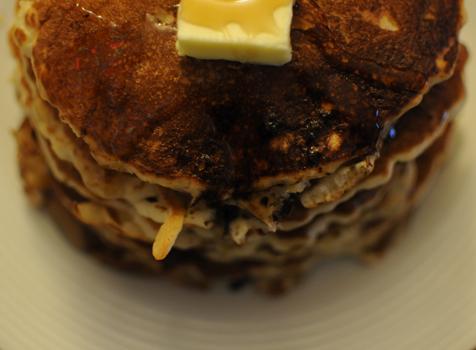Pancake Week: The Brief Psychology of a Pancake Tradition
August 3, 2011
March 1 marks the beginning of Pancake Week, leading up to Pancake Day on March 8. Although we all know and love these fluffy delicacies, most people probably don’t know that Pancake Day is rooted in the observance of Lent. Traditionally, Pancake Day is rooted in both Christian and pagan beliefs, and is similar in purpose to Fat Tuesday, also known as Shrove Tuesday. It serves as the last chance for people to indulge in eggs, fat and sugar, and the social activities which give way to the more sober nature of Lent. Growing up, my perception of the holiday was neither Christian nor pagan, but simply a day that I was required to eat pancakes no matter what, thanks to my dad’s mysterious obsession with the day.

I come from a family with an ex-Catholic, partially-Irish father who, although somewhat departed from his religion, still felt the need to carry on certain Catholic traditions such as eating pancakes on Shrove Tuesday. He failed to tell the rest of the family why we were partaking in this activity, however, and I don’t think that our version was pre-Lent worthy. On the last Pancake Day I remember, we had a typical dinner of steak, broccoli and potatoes, and a side of enormous pancakes. This meant that we were not only bingeing ourselves of eggs and milk, but also of things like steak.
As a child, I remember thinking that it was extremely strange to be eating pancakes with a meal such as this one, yet my dad followed the tradition religiously (no pun intended) and somehow managed to flip pancakes while also barbequing steak. I couldn’t quite figure out where my dad’s obsession with Pancake Day came from, considering we weren’t very religious. Despite his Catholic background, it didn’t add up; we rarely attended church, and it was a Baptist church at that. Then I thought a bit more about the pancake tradition and had an epiphany. I realized that my father grew up on a farm where maple syrup was produced. And suddenly so much made sense to me. This was why we ate green beans and refried beans with syrup, and why there was always an abundance of maple candy and ice cream in the house. When you grow up with an excess of maple syrup and you’re poor, you devise ways to enjoy the maple syrup, and pancakes are a perfect way to do that. This accounted for my dad’s attitude of “quick, make some pancakes, it’s Pancake Day!”
I realized that even though I grew up in a household that did not produce its own maple syrup and could afford to throw it out if need be, my dad was not only addicted to maple syrup from his youth, but for some strange reason felt the need to use as much of it as he possibly could during syrup season. It was as if the minute maple syrup season started, a switch had gone off in his head that said, “Must transport syrup to mouth.” So maybe the day wasn’t as much about the pancakes as the syrup. And the syrup had some deep connection to the past, a farm, scarcity and religion.
So whether you are religious and actually have a reason for celebrating the day, own a maple syrup farm or simply like pancakes, this year you can start your own pancake traditions. Pancakes, after all, are delicious. Whether you eat them with steak or chocolate, to purge your sins or to purge your cupboard, you’ll have a guilt-free week to indulge, and to make your friends wonder what event in your past caused you to have such an obsession with the griddle cakes. Pancake Day, in my experience, can get pretty deep, after all. So fry them up, smother them in syrup and prepare for Lent. Bon appétit!











